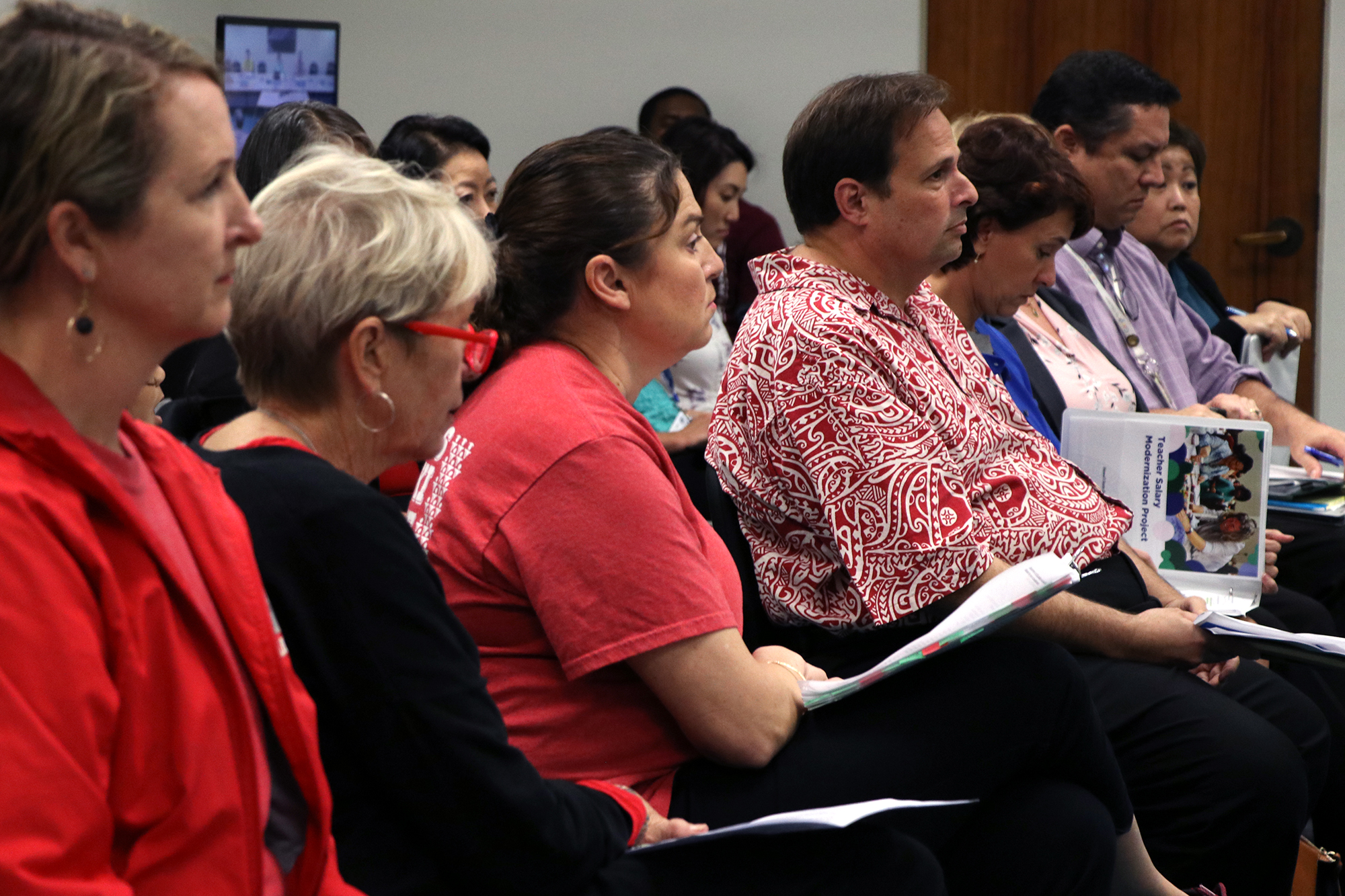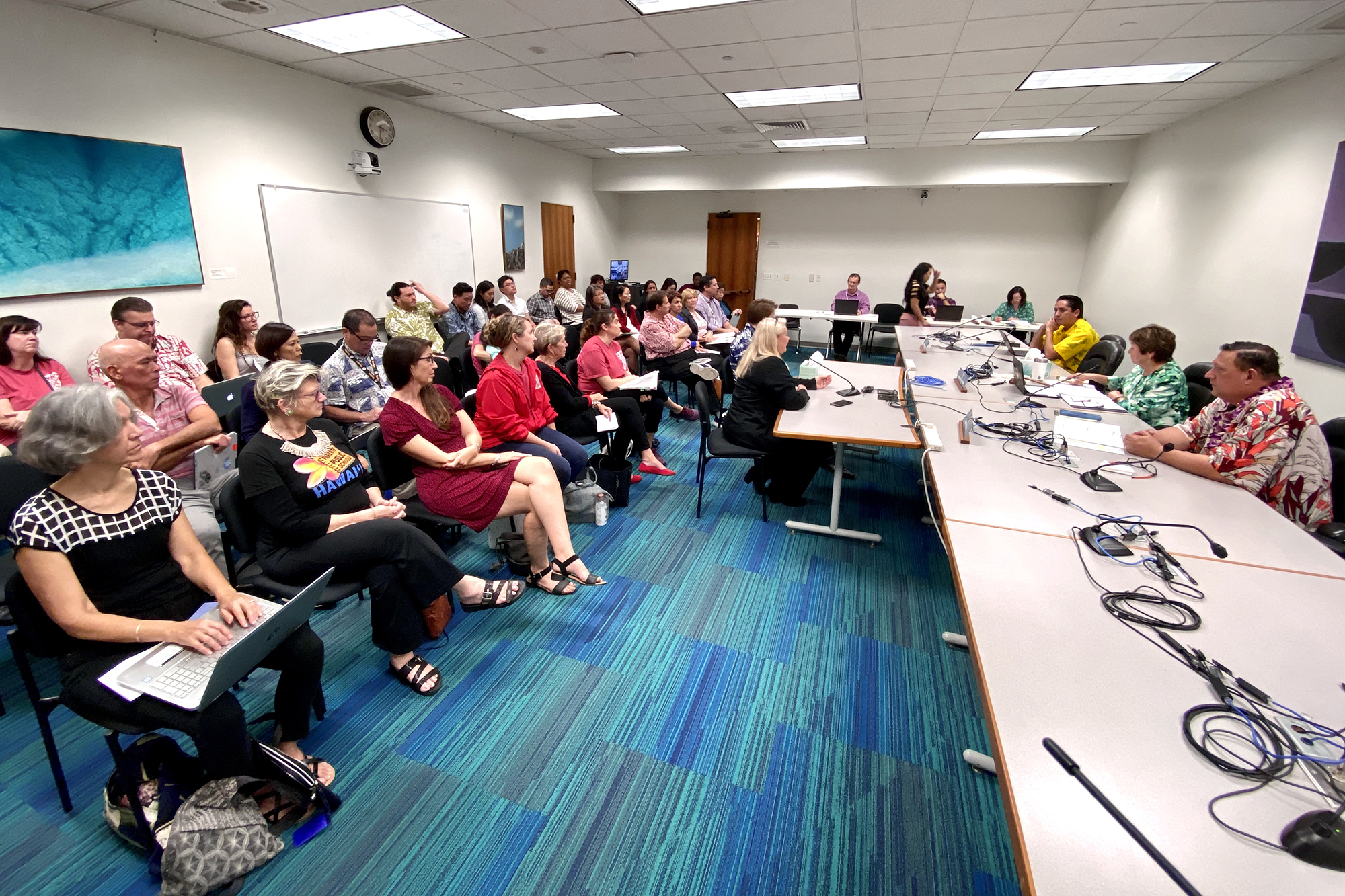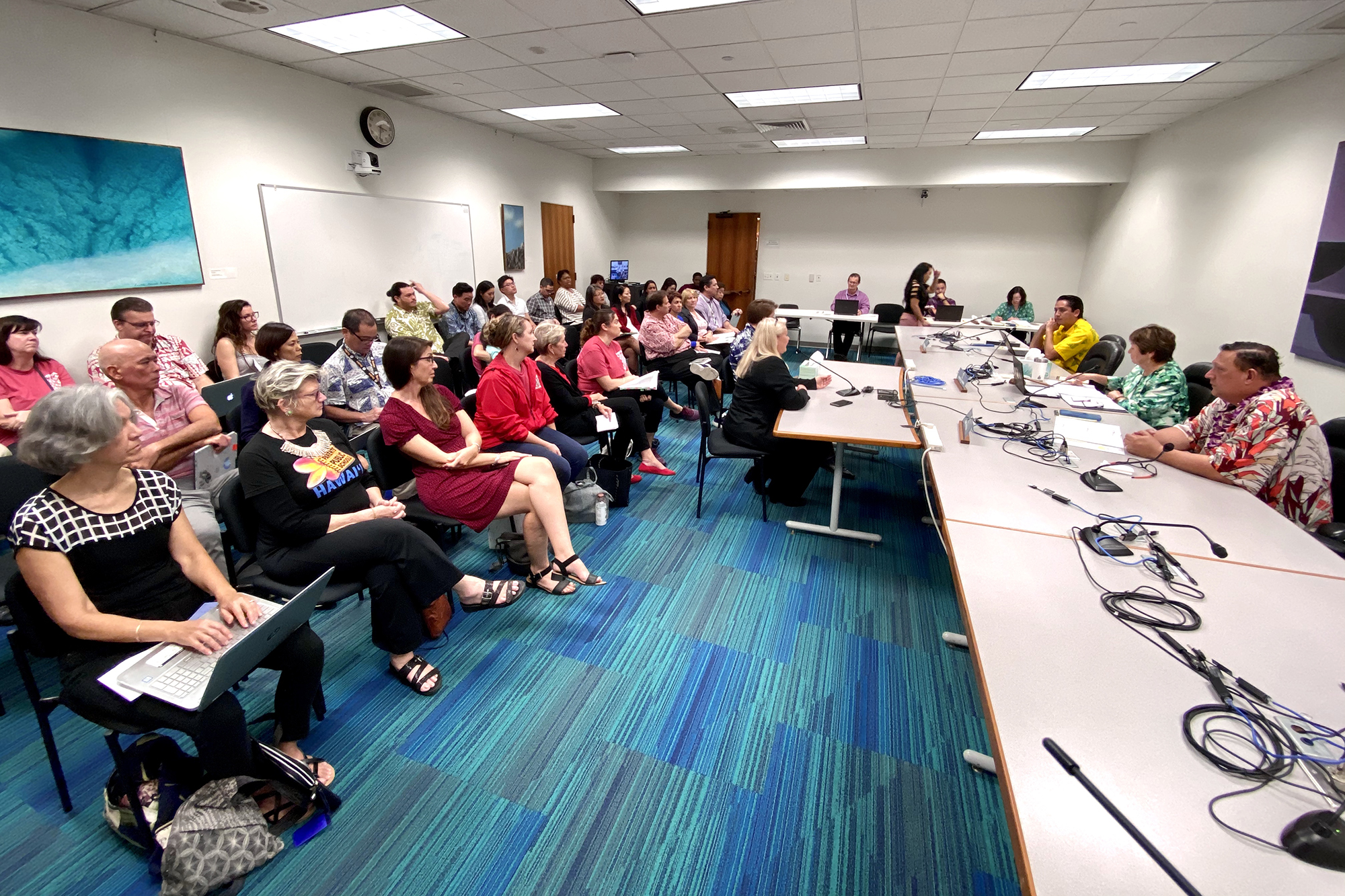Click here to watch this video on YouTube.
After hearing emotional testimony from public school teachers who explained how low teacher pay affects them and their students, the Senate Education Committee Wednesday approved a proposal to appropriate $25 million to continue funding differentials in teacher shortage areas and adjust veteran’s teacher pay higher next school year. But that’s still $45 million short of the expected cost to raise pay for nearly 7,000 veteran teachers affected by compression while also continuing shortage differentials for special education and Hawaiian language immersion educators as well as those teaching in hard-to-staff schools.
Senate Bill 2488 would "1) Make the necessary salary adjustments for approximately 6,300 experienced senior teachers by recognizing their professional service to the Department of Education through discretionary salary adjustments; (2) provide funding for additional teacher pay for the areas of special education, hard-to-staff geographic locations, and Hawaiian language immersion programs…" or a combination of both (1) and (2).
Dana Shishido Kobayashi, who teaches third grade at Wheeler Elementary, told the committee why so many veteran teachers leave the classroom and the state: salaries that are the lowest in the country when Hawaii’s high cost of living is factored in.
“I am a veteran teacher of 30 years, I have two degrees. However, I am not at the top step of the salary schedule,” said Kobayashi, explaining how she’s affected by the compression problem, in which many teachers have not seen their pay rise during the recession and tough economic times.
“My daughter says she does not want to be a teacher because she sees how hard we work. You know some of us, we do put in 12- and 14-hour days. And she says, ‘Mom, you don’t make enough money,’” Kobayashi said, her voice heavy with emotion. “You know, we want the keiki to follow in our footsteps, we want Hawaii to be a better place. How are we gonna do that if we do not make this career attractive.”
Another veteran, Shirley Yamauchi, teaches seventh grade English at Kapolei Middle.
“It took me 20 years to get to my current $72,000 salary. This coming fall, I am desperately looking forward to my across-the-board pay raise,” Yamauchi said, explaining that the low pay leads to constant turnover with unqualified emergency hires and substitutes in about 1,000 classrooms statewide.
Yamauchi said her school has four classroom vacancies, all with long-term substitutes this year.
Related Stories
- If approved by lawmakers, salary adjustments would bring $46M worth of raises
- Frequently asked questions about teacher shortage crisis differentials
- BOE approves $14.7 million in shortage differentials to start next month
- Increasing hard-to-staff bonuses would ease Hawaii's teacher shortage crisis
- SpEd teachers say more prep time, pay would help ease special ed teacher shortage
- Teacher shortage crisis forces principals to hire Hawaiian immersion teachers who don’t speak Hawaiian

'We are here to stay if we can afford it'
Vikki Pescaia, a digital media teacher and robotics coach at Waialua High and Intermediate, told lawmakers: ““At step 11 class 7, I earn only $12,000 more than a first-year teacher with a bachelor’s degree. That’s because of compression.”
She advises a number of clubs at the school and paid to enroll in bus driver training out of her own pocket to save Waialua $300 bus rental fees by driving the bus herself so students can afford to attend field trips and events.
“I am looking right now at reducing my after-school volunteering. I’m also an advisor for class clubs and we do community service for class clubs in Kahuku, all the way to Mokuleia. I can’t do all of that if I’m trying to get a second job to help pay for my daughter’s (college) education,” Pescaia added.
“We are here to stay if we can afford it,” she concluded.
Her Waialua High colleague Marsha Taylor, a culinary arts teacher, said she had planned to retire at the end of this school year after 28 years in the classroom, but decided to teach a few more years because of the prospect of higher salaries in the fall, if lawmakers approve funding for a salary adjustment for teachers who've been affected by compression. An HSTA analysis found that nearly 7,000 teachers who've taught for 10 years or more in Hawaii should have their pay increased anywhere from $900 to $17,000 because their pay stagnated during hard economic times.
Taylor’s granddaughter attends Waialua High where she teaches and she knows first-hand how teacher turnover affects students.
“Last year, we had our entire eighth grade leave. All the teachers left. And my I told my daughter, ‘I don’t know who’s going to be your teacher.’ We’ve had fabulous staff out there, but they were pretty young. They were vivacious, young, but they couldn’t afford to live there, on the North Shore in particular, anymore,” Taylor said during tearful testimony.
“It is this pay that these poor young kids that come from the mainland or teach here in Hawaii, it’s really hard for them,” Taylor added.
In response to emotional testimony from Taylor, Pescaia, Kobayashi and other educators, State Sen. Kurt Favella (R-Ewa Beach-Iroquois Point), a former school custodian, wiped tears from their eyes during the committee hearing.
Senate Education Committee Chair Michelle Kidani (D- Mililani Town-Waikele) said her committee received about 300 pieces of testimony on SB 2488, the proposal to fund a pay adjustment and the differentials starting school year 2020-2021. The majority of written testimony came from educators across the state.
The committee voted Thursday to give the measure initial approval, sending it next to the Senate Ways and Means Committee for further consideration.
DOE salary study concludes something we've long known: Hawaii teachers are woefully underpaid
The Department of Education released a teacher compensation study Tuesday that found Hawaii educators are paid far lower than comparable districts in the continental United States.
The study concluded that Hawaii's teacher pay is anywhere from $8,000 to $26,000 less than the average teachers in mainland districts in three different comparison groups based on size, cost of living, and districts that are attractive to live in.
“This reiterates the urgency of addressing our teacher compensation challenge and our teacher recruitment and retention challenge,” said DOE Superintendent Christina Kishimoto.
HSTA President Corey Rosenlee told the Senate Education Committee, “One of the questions we’ve been getting is ‘If you actually pay teachers better, does that improve the quality of teachers?’ And the answer is yes and there’s extensive research that shows if you have a competitive wage, in districts that have competitive wages, not only do you retain teachers, but higher quality as they get more experience.”
A fourth-grade teacher at Waialua Elementary, Tiffany Eason said experienced educators have brought a national spotlight on her school, which earned two National Blue Ribbon awards in the last 10 years.
“If we lose our seasoned teachers, we will not be able to sustain this level of achievement. At this point in my career, I am questioning how much more personal sacrifice I am willing to continue to make and how this sacrifice is impacting my family,” Eason said.
“We are struggling to support our families and make a decent living. I did not ever think I would be practically living from paycheck to paycheck after 25 years of service. We frequently have to dip into our home equity line of credit to pay for basic needs like car insurance and other expenses that arise,” Eason added. “After giving more than half of my life to teaching, I am now looking at other employment options in order to meet my family’s financial needs.”
Vickie Parker Kam, the academic growth coach at Ilima Intermediate, who’s been employed by the DOE since 1992, delivered some sobering statistics.
“As an induction and mentoring lead over the past five years, I’ve helped probably 50, 55 teachers personally, through their first two years in Hawaii’s education system. But half of them are gone now,” Kam said. “They don’t stay, because they can’t afford it. Addressing compression now will allow those coming behind to keep up through time and give us a chance to breathe and live a little more comfortably.”
“Our classes are now filled with long-term subs that are not qualified in their content areas,” Kam said, her voice filled with emotion. “Then people say we’re not doing our jobs because test scores don’t show that the kids can do what they need to pass the test. So we’re fighting with one hand tied behind our back.”
Christine Russo, a science teacher at Campbell High, told lawmakers: “Keeping our experienced teachers in Hawaii and adjusting their salaries to appropriately reflect their years of service will be a crucial way to fix the teacher shortage crisis. It’s really important to have our most seasoned teachers in the classroom, so we can minimize the vacancies and what’s happening, which is the subsequent replacement of the experienced teachers with newer, more inexperienced teachers.”
Related Stories
- More than 1,300 people sound off about how to end Hawaii's teacher shortage crisis
- On Hawaii Island, educators suggest ways the state could retain more teachers
- On Maui, educators who are parents worry their own children's education system is failing them
- In Kapolei, teachers and students tired of low teacher pay
- In Honolulu, educators, parents ask for higher teacher pay

Former teacher, parents group leader call for higher teacher salaries
Michal Nowiki, who taught in Hawaii public schools for nine years, testified in favor of the teacher pay proposal. He last taught at UH Lab school, where he chaired the math department.
“My last year, in 2018, I made the difficult decision to leave education because the entire math department quit, and they went into teaching, just in private schools. I made the difficult decision to leave Hawaii,” to work outside of education, Nowiki said.
Now he’s working two different jobs outside of teaching in Hawaii.
“I’m making 50 percent more than I was as a teacher. I am working way fewer hours and I have a flexible schedule. This is infuriating and frustrating because I would like to have stayed in the classroom,” said Nowiki.
Deborah Bond-Upson, a longtime board member of Parents for Public Schools of Hawaii, which represents 1,200 public school parents. She’s also the founder of the Fund Our Hawaii Schools Coalition.
“We’ve all heard that (teachers) really need five years to come up that steep angle to get to your effectiveness level. But studies show that teachers get yet more effective beyond the five-year point,” Bond-Upson said.
“We believe our keiki deserve teachers who have experience. And they certainly must have teachers that are qualified in every classroom. So we ask to find ways to fund the important two parts of this bill,” Bond-Upson added.

